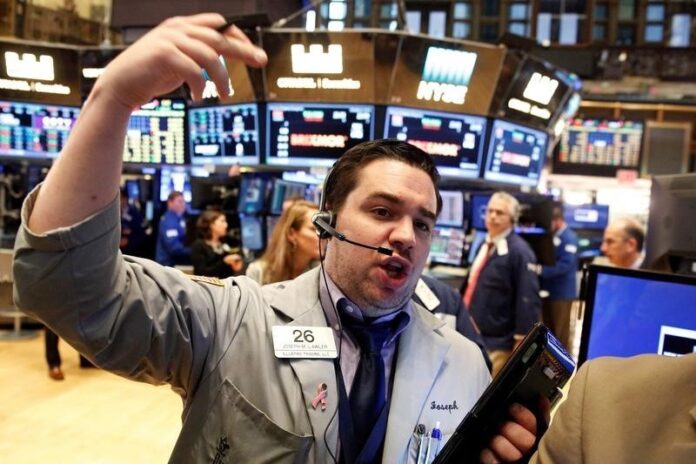LONDON: A rebound in world stocks reached a lofty 11 per cent on Wednesday and commodities made gains too, as coronavirus-battered markets leapt on news of a $2 trillion US fiscal stimulus package.
Hopes the economic devastation of the global outbreak could be alleviated gave world equity indexes their first back-to-back gains in a month as volatility gauges eased away from full-blown crisis levels.
Europe’s main markets in London, Frankfurt and Paris all opened 4p-5pc higher after the Nikkei in Tokyo had risen almost 7pc following some historic moves on Wall Street the previous day.
The Dow Jones Industrial Average had soared over 11pc in its biggest one-day percentage gain since 1933 and the S&P 500 scored a 9.4pc jump – its tenth best day on record out of 24,067 trading sessions since daily data started in 1927.
“The right steps have been taken but the main thing that is driving the market at the moment is sentiment,” said Chris Dyer, Director of Global Equity at fund manager Eaton Vance.
He said it was now vital to see some positive signs on the virus itself and that health systems were not being overwhelmed. “Market direction can change very, very quickly depending on one item of news or one development,” he added.
The US stimulus deal, billed as a $2 trillion package, is expected to include $500 billion in direct payments to people and $500 billion in liquidity assistance.
US President Donald Trump had also pressed his case for a re-opening of the US economy by mid-April, though that had met immediate scepticism given the rise of infections in the United States is now among the highest in the world.
In particular, its financial hub of New York City suffered another big increase in the number of infections, fuelling worries about a shortage of hospital beds.
DOLLAR DE-STRESS
In the currency markets, the dollar slipped for a third straight session as the scramble for liquidity was soothed again by the super-sized US stimulus plan.
The risk-sensitive Australian dollar jumped over the 60-cent mark for the first time in a week and euro traded up 0.4pc up past $1.0835 in a fourth straight day of gains.
With traders moving gradually away from safety bolt holes, the Japanese yen eased to 111.34 yen per dollar to leave it just off a one-month low.
Bond markets were also calmer. Benchmark US Treasuries were yielding 0.86pc while in Europe Germany’s 10-year yield edged a basis point higher to -0.31pc, tailed by other higher-rated government debt.,
In Italy which remains the epicentre for the virus in Europe, Rome’s 10-year borrowing costs were unchanged at 1.59pc; nearly half last week’s high of 3.01pc.
In metals markets, gold changed hands at $1,610.0 per ounce, retaining its gains of almost 5pc on Tuesday, its biggest jump since 2008.
Oil prices bounced another 2pc as hopes for US stimulus also boosted hopes for global demand.
Brent crude futures rose to $27.51 per barrel. That is up about $5, or about 13pc, from their 18-year intraday low on Friday. Still on the month, the market is down 45pc.




